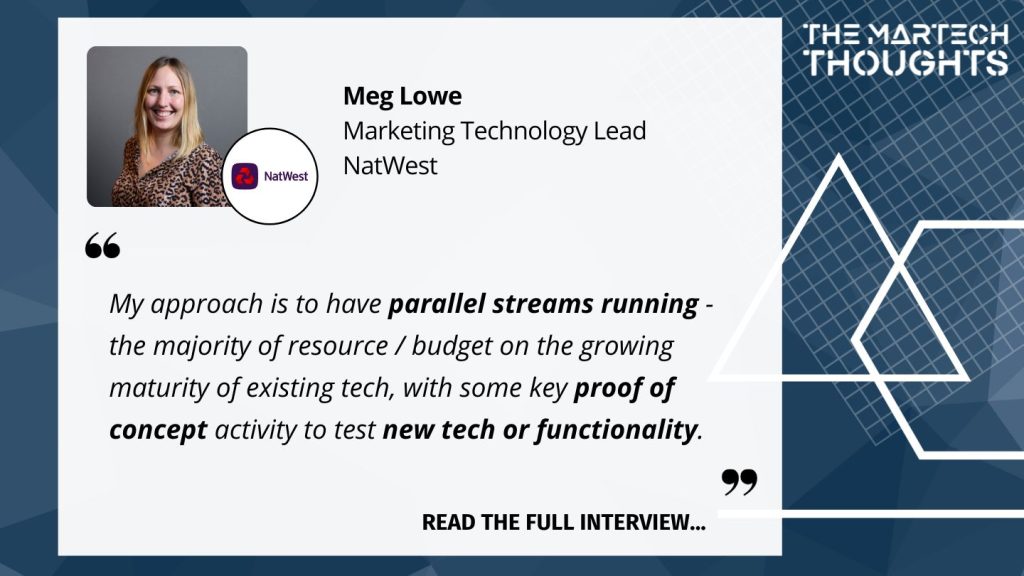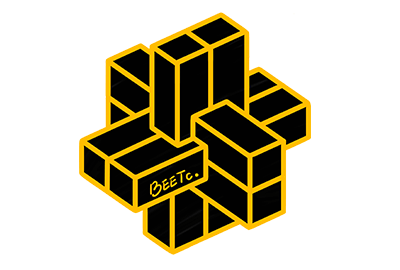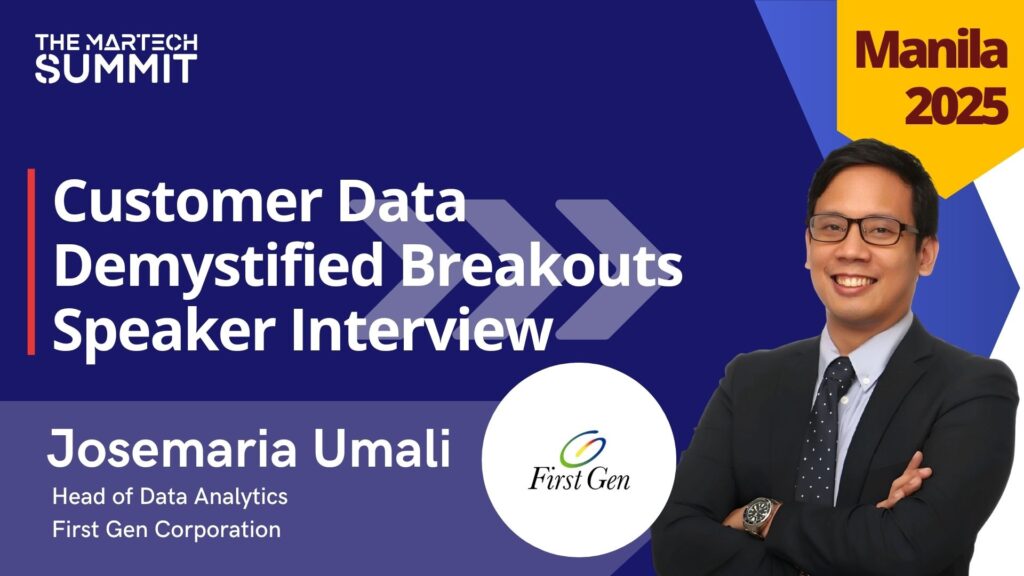
Welcome Meg Lowe, Marketing Technology Lead, NatWest, sharing her insights on MarTech Stack Optimisation, Marketing Team Management, & Customer Data, as part of the MarTech Thoughts series.
What’s your industry? How would you describe your job?
Financial Services. I help NatWest provide better engagements with their customers through the use of technology and data
What is the one marketing platform/app/solution you can’t live without? Why?
A DAM (Digital Asset Management) – we talk a lot about the data needed to power personalised customer experiences, but people often forget that content is absolutely critical to those experiences – and we need a DAM to help us manage and optimise that content.
At your organisation, what tasks in marketing are good to automate and what tasks still need a human touch?
There are definitely opportunities to automate parts of our marketing operating model, particularly some of the basic processes and hands-off e.g. in campaign delivery. Gen AI provides us with some interesting opportunities in the content production space, but right now we still need a human creative spark for content that is emotionally engaging. We’re embracing new technology to understand and test use cases for marketing automation to validate what does and doesn’t make sense for us as an organisation.
How do you see the skillsets needed for the marketing profession changing?
Advancements in marketing technology are making it easier for marketing teams to self-serve on activities we’d previously have had to outsource to agencies or internal specialists. I see marketers becoming far more hands-on in the segment and content creation processes, as well as ongoing measurement and in-flight optimisation of their own activity. Marketing teams can be empowered to take ownership of their customer experiences without multiple hand-offs.
This will require a baseline understanding of a variety of new skillsets; from data querying, technology, digital marketing and with the emergence of AI and natural language prompts, understanding how generative AI works and how to get the most out of it will become more crucial, irrespective of the role profile.
With more consumers being conscious of their data being shared, how do you overcome the growing concern?
The important thing is value exchange – consumers need to see that their data is being used for their own benefit, to bring them more value. This comes down to trust, and that is built through repeat experience. The more we can demonstrate the value of using personalised data, the more trust we can build and (hopefully) the more data we will have available to optimise experiences further.
First and zero-party data will play a major role in personalisation of tomorrow. This is the value exchange. And marketers will need to think of new and creative ways of incentivising consumers to willingly part with information which will improve their experiences. From a business perspective, getting the foundations right to enable marketers to effectively use this data will be the biggest challenge particularly for large organisations. Ensuring there’s a co-ordinated data strategy and data flows between the different elements of our tech-stack.
What are your views on having a single stack? (e.g. Google or Adobe vs a mix of best stacks for each function)
As with anything there are pros and cons. With a single stack, you have to accept some limitations as not everything will be best-in-class, but what you do (typically) get is better integration between solutions. It often depends on the scale at which you’re implementing, and how much time and resource you have to implement that solution as to which the best option to go with is – often, single stack or close to single stack will work best for a larger enterprise due to economies of scale. Ultimately, it comes down to prioritising the most important challenges the business is trying to overcome and selecting the tool which is going to best achieve the outcome, e.g. is the ability to achieve hyper-personalisation more important than operational efficiency, or do you need a balance.
But with any decision to take on a new piece of tech, ensuring the right skillsets exist internally to get the most out of the tech is equally as important.
How do you balance experimenting with new technologies vs investing in current technologies that you already utilise?
A priority for any MarTech team should be to get the most value out of the stack they already have as marketing technology requires significant investment. My approach is to have parallel streams running – the majority of resource / budget on the growing maturity of existing tech, with some key proof of concept activity to test new tech or functionality.
Regardless of the approach, it’s vital that Martech teams continually keep their knowledge-base up-to-date with emerging technologies, as the growth curve is exponential! This is one area where Martech conferences and networking events provide massive value to practitioners like me and my team.
How do you tackle department silos when it comes to looking into CX proactively?
A big focus for me has been to understand and align priorities between the departments that own different parts of CX – it’s about finding common ground and understanding points of difference. For example, while the way we achieve personalisation on web vs. in paid media is different, some of the core tech and principles will be the same. We look at how we can align on those core capabilities.
From an operational perspective, and as our is inherently complex, an important principle for our team is having a seat at every table.
I typically spend about 40% of my time promoting our team internally, whether that’s at conferences, or speaking at other department all hands sessions, I’ve found this to be an effective way to break down traditional silos.
What’s the best advice someone has ever given you?
When a something doesn’t work, it’s not a failure – it is an opportunity to learn and get better. But if you don’t have any lessons to draw and improve on, then that is the failure.
A big thank you to Meg Lowe, Marketing Technology Lead, NatWest, sharing her insights on MarTech Stack Optimisation, Marketing Team Management, & Custimer Data.
If you want to connect with Meg after reading her MarTech Thoughts, please reach out to her via her LinkedIn Profile!
See more MarTech Thoughts interview pieces here!
Last updated: Oct 2023













